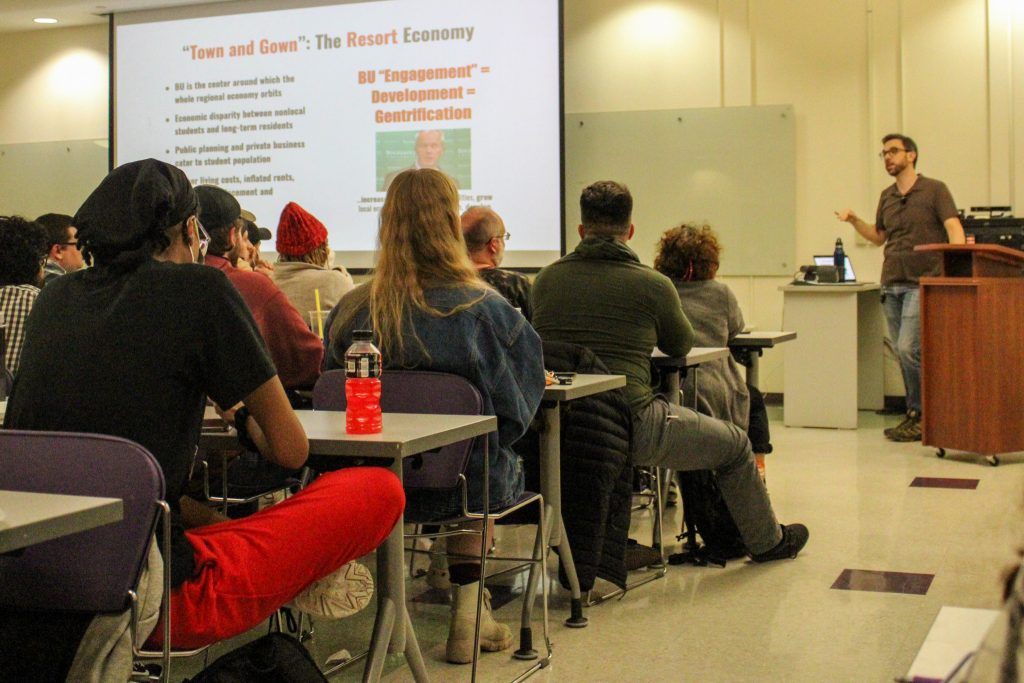On Tuesday, the Stakeholders of Broome County hosted their second-annual Housing Action Summit, with backing from 15 on-campus organizations.
During the event, several issues related to housing in the Binghamton Community were discussed. The primary organizer of the event was Binghamton University’s chapter of the New York Public Interest Research Group (NYPIRG). Other co-sponsors included the pre-law fraternity, Phi Alpha Delta, the Women’s Student Union and the Roosevelt Network, with the latter two organizations having been involved in the first Summit, which took place in 2021.
Raissa Bellucci, NYPIRG’s housing and homelessness campaign leader and a sophomore majoring in classical civilizations, described how the relationship between NYPIRG and the Stakeholders — a housing activist group — was formed. The connection began through the work of both Bellucci and Josh Samuel, president of NYPIRG and a senior majoring in philosophy, politics and law.
“Josh and I decided it was important for [BU’S] chapter of NYPIRG to get involved, because a large part of why there are so many issues in Broome County regarding housing is due to [BU] students,” Bellucci wrote in an email. “Since students will pay these high prices, locals get pushed out because they cannot.”
As the event kicked off, seats filled with students, community residents and speakers. Representatives of the Stakeholders and related community organizations described infractions made by “slumlords,” or landlords who demand exorbitant rent prices for poorly maintained properties, as well as the impact the financial disparity between students and local residents has on the housing market. Attending organizations also informed attendees on ways students and community members can be involved in housing activism in Broome County.
Bob Wilson, a member of the Stakeholders and an adjunct lecturer of English, was the evening’s main speaker. Wilson described how the arrival of students, with median household annual incomes $100,000 greater than residents of the local area, has led to an uptick in housing prices around the University.
“By bringing [BU students] here, we end up with [a] higher cost of living,” Wilson said. “We end up with inflated rents because landlords are virtually not regulated at all in this city and they can charge whatever they want. And they price out folks who then have to be living at the mercy of slumlords in places that are uninhabitable because they can’t afford the housing that’s marketed to [the students].”
Rebecca Rathmell, a representative of the Stakeholders, followed Wilson’s speech with information evidencing a substantial increase in homelessness in Broome County over recent years. Rathmell connected these changes to developments within the University which have driven up housing costs, such as the construction of the University Downtown Center in 2007.
Other ongoing projects were also discussed at the Summit, all aimed at alleviating housing concerns and homelessness. Terry Weathers, a representative of Citizen Action of New York, informed listeners about the Street Outreach program, where volunteers are able to directly support homeless individuals by handing out supplies to them. Hajra Aziz, the executive director of the Southern Door Community Land Trust, laid out their organization’s goal of providing “permanently affordable” homes.
Jabari Richardson, Masters of Science ‘22, is the mission impact director of the Young Women’s Christian Association of Binghamton and Broome County. Richardson gave students attending the event advice on participating in activism against increasing local housing costs.
“Talk to your fellow students, but go outside in the community and talk to your teachers, talk to your community members and get involved,” Richardson said. “Understand that you’re not just a temporary resident of this community, you affect its development.”
JP Dillon, a senior majoring in environmental studies, became involved with the Stakeholders through doing research on housing in Broome County. Dillon expressed his desire for students to continue to engage with the issue.
“What I’m hoping other students take away from this event is, although we are brought in without much knowledge or background information about what goes on in the city, kind of overarching,” Dillon said. “I hope that students will take the opportunity to learn about it.”



